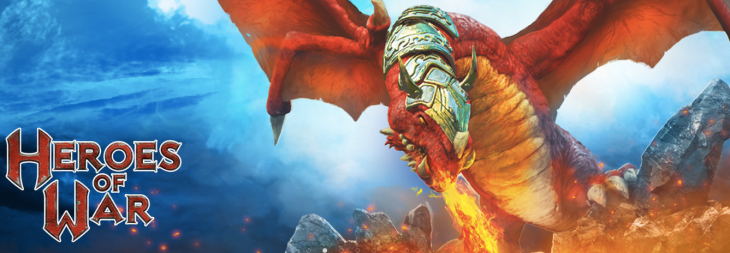Yet more consolidation afoot in the gaming business. Gree International, the global arm of the Japanese gaming giant that focuses on social and mobile gaming, is downsizing in San Francisco by cutting 30 percent of jobs, or 120 people, the company has confirmed. At the same time it is doubling down on growth in other markets. Gree is acquiring Australia’s Twiitch — makers of Heroes of War and other titles (and not to be confused with Amazon’s gaming acquisition, Twitch) — to spearhead a new office in Melbourne. Separately it also also opening a new office in Berlin, its first in Europe.
Terms of the Twiitch deal were not disclosed, but it will involve both of the co-founders, Shane Stevens and Steven Spagnolo, joining Gree to run the office in Melbourne.
The two waves of news — one of expansion and one of contraction — speak to some of the ongoing challenges in the mobile and social gaming worlds, where success can be extremely lucrative but tastes can often be just as fickle. But it’s not only mobile or social gaming that can be tough. The news comes on the same day that Razer has announced its acquisition of Ouya’s software business and the teams that help run it after the latter failed to make a go of it as an independent company.
For Gree, the big challenge is to find not just big hits, but those that can be sustained and built up over long periods of time.
To date, the company has been known for generating revenues around virtual goods. “For the next generation of growth, I think you need three things,” Gree International COO Andrew Sheppard said in an interview with TechCrunch. “The ability to build a mass market franchise, with accompanying creative and marketing activity; you need game designers to build excellent gameplay in a marketplace that is increasingly commodized by clones; and you need systems design that delivers a very high life-time value.”
Gree says that its top three titles — Modern War, Crime City, and War of Nations — have been downloaded over 130 million times. Knights & Dragons, which was co-developed with IUGO, brought in over $80 million in revenue in its first two years. The company is valued at $1.4 billion and has a run rate of $1 billion.
The layoffs at Gree were initially reported last week and come amidst other layoffs and closures, including closing down the Vancouver studio in May. This latest round is focused on the company’s San Francisco operations, the HQ of Gree International Inc.. The whole of Gree International had just under 1,800 people working for it as of last quarter.
As with the Vancouver closure, Gree describes the staffing changes as a move to “hard reset the business” so that it can focus on fewer business areas — specifically lifetime value (LTV) game development (that is, developing more games in franchises), as well as live operations and franchise marketing.
In other words, while most of the time layoffs will cut costs, the company seems to imply that this is also just about reorganizing and putting investment where Gree thinks it could be best used. That could also mean more acquisitions in the future.
“Financial constraints are not really an issue for us,” said Sheppard. “If a company is exciting and priced well and in games for the long term, we’re excited.”
This is also where the acquisition and new office openings will fit into the mix, Sheppard told TechCrunch.
“Most companies would not have bundled these events together, and would have instead done them step by step,” he said in reference to the announcement of the job cuts alongside the acquisition and expansion to new markets. “But the broader transformation has been in planning for six months already and things are now moving incredibly fast and that’s part of the reason why we decided to announce everything together.”
The Melbourne office will focus on kickstarting a new wave of tech development for the business, focusing specifically on the mid-core and hard-core markets and maybe even more expansion into other platforms beyond mobile.
“I met Steven and Shane in October/November of last year and was immediately impressed by their gaming experience, and their 40 collective years in smartphone and console gaming,” he said. “The focus on social gameplay mechanics and fidelity cut quite differently.”
He says that the next generation of games that are being developed rely on things like machine learning to improve the experience for users, and this is one of the areas that will be feeding into Gree’s games going forward.
“The team at Twiitch has always been committed to building great mobile experiences for the core gamer. Working with GREE allows us to reach an even wider audience and offer more novel, innovative gameplay to players worldwide,” said Spagnolo, the CEO of Twiitch, in a statement. “We are proud to extend the GREE brand into Australia, as we share GREE’s passion for mobile games and look forward to continuously raising the industry bar, together.”
The Berlin office, meanwhile, is strategic for a couple of reasons, he says. The first is that the city is strategically placed for Gree to build out more marketing across Europe but also into Russia, Turkey and related parts of the continent.
Gree, according to Sheppard, wants to tap into some of the spirit that is attracting other startups to the city. “Berlin is a really exciting place to be right now, with an amazing confluence of tech and creativity that hasn’t been seen in Silicon Valley for 10-20 years now. Plus the low prices on real estate are a great way to attract talent,” he said.
Financial terms of the transaction for Twiitch were not disclosed.
Updated to clarify the percentage and who is affected.
